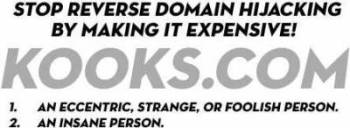Excerpt from plaintiff’s Web site at kooks.com
No case or controversy exists between Global DNS, LLC, and Kook’s Custom Headers, Inc.
That’s what Western District Judge Robert Lasnik found on Sept. 22 when he dismissed plaintiff’s declaratory judgment claim that its registration and use of kooks.com is lawful under the Lanham Act and the Anticybersquatting Consumer Protection Act.
Plaintiff Global DNS offers Internet-based services, including selling and monetizing domain names.
Defendant Kook’s manufactures and sells custom headers (high performance exhaust system parts) for cars and motorcycles. It registered KOOKS as a trademark in 2001.
In February 2008, Kook’s filed a WIPO complaint seeking to have kooks.com transferred to it on the ground that Global had registered and used the domain name in bad faith. The same day, Global filed this action.
After it received the WIPO complaint, Global dissociated the domain name from its domain name parking services, removed all content directed to Kook’s and its competitors, and posted its own content on the Web site relating to the WIPO dispute and this action. The new content states that Global wants to “make[e] it expensive” for Kook’s and “absolutely refuse[s] to make it cheap and easy.” The content also reminds defense counsel, “Don’t Forget to Bill Your Client.”
The WIPO panel dismissed the complaint, finding that Kook’s had not shown that Global had registered the domain name in bad faith.
In August, Kook’s signed a covenant not to sue Global for the past and present content on Web sites associated with its domain name.
Based on that covenant not to sue, Kook’s moved to dismiss for lack of subject matter jurisdiction because of a lack of a real dispute between the parties.
The court agreed. It found: “Defendant argues that there is no actual controversy because it executed the covenant not to sue. The covenant means that there is no case or controversy regarding the past or current content posted to the domain name. It is undisputed that there is no controversy regarding Global’s current conduct, including any content on the <kooks.com> web site.
“The controversy, if one exists, relates to how Global may use the domain name in the future. In the covenant not to sue, defendant reserved the right to pursue remedies in the event that Global reintroduced the objectionable content on the web site. However, there is no evidence that Global plans to do so. In fact, during [prior] WIPO proceedings, Global’s managing member stated that had defendant contacted Global prior to filing the WIPO complaint, Global ‘would have blocked the terms ‘headers’ and ‘custom headers’ from appearing on the Website associated with the domain name name.’ In fact, Global’s filings are devoid of any information about what, specifically, it intends to post on the site. Without some evidence that Global intends to reintroduce content on the domain name that could violate defendant’s rights, there is no actual controversy. Instead, the Court would be forced to speculate and offer an impermissible advisory opinion about potential hypothetical future conduct.”
The case cite is Global DNS, LLC v. Kook’s Custom Headers, Inc., 2008 WL 4380439, No. 08-268 (W.D. Wash. Sept. 22, 2008) (Lasnik, J.).